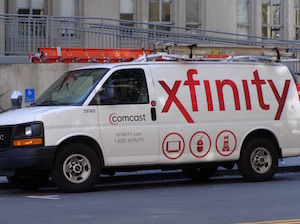
Only one, where it counts.
A sharper take on California’s uncompetitive market for telecoms services goes before the California Public Utilities Commission tomorrow. A revised draft of a decision authored by CPUC administrative law judge Karl Bemesderfer was posted yesterday. It addresses the tall stack of comments on the first draft filed by telecoms companies and advocacy groups alike.
The major change is a promise to address tactics that monopoly telephone and cable companies use to block competitors, particularly regarding “access to poles, conduit, and rights of way”. The new draft decision requires the commission to begin addressing the problem within nine months. Incumbents will still have to hand over information about middle mile fiber and other critical bottlenecks they control, although it’s only a requirement for the next two years. After that, the CPUC is supposed to assess the data and decide whether to keep collecting it.
Another welcome edit is to highlight two key findings in the original draft:
- The residential high speed broadband market is highly concentrated throughout California.
- Aggregated and averaged market data understate the barriers to competitive market entry, and thus the market choices available to individuals and businesses, particularly in rural areas.
The draft also highlights the disparity between incumbent telephone and cable companies – although the services offered are increasingly indistinguishable, those two sides of the same coin play by different rules, particularly where access by would-be competitors to monopoly infrastructure is concerned. It’s an important point, because, as the draft points out…
Although there are varying estimates, roughly half (or more) of California households have access to only one (or no) wireline broadband provider at speeds of 25 Mbps down and 3 Mbps up.
When it’s only one provider offering service at those speeds – which is the the minimum level for advanced services, as declared by the Federal Communications Commission and affirmed by the draft decision – that provider is almost always a cable company. The legacy privileges that cable companies enjoy at the expense of would-be competitors and consumers are beyond the scope of the draft that’s on the table, but the foundation for next steps are firmly established.
The draft is on the agenda for tomorrow’s CPUC meeting.
